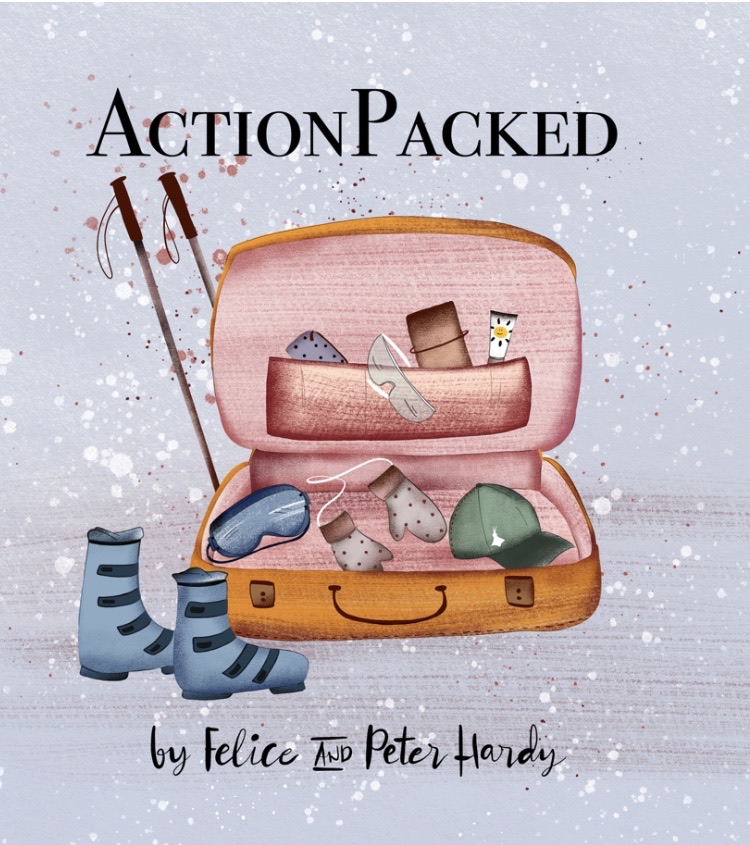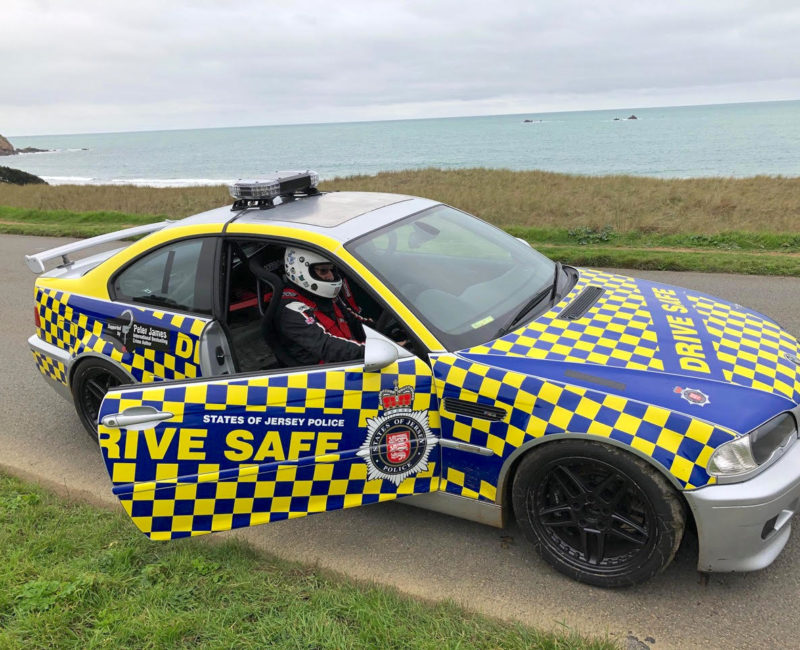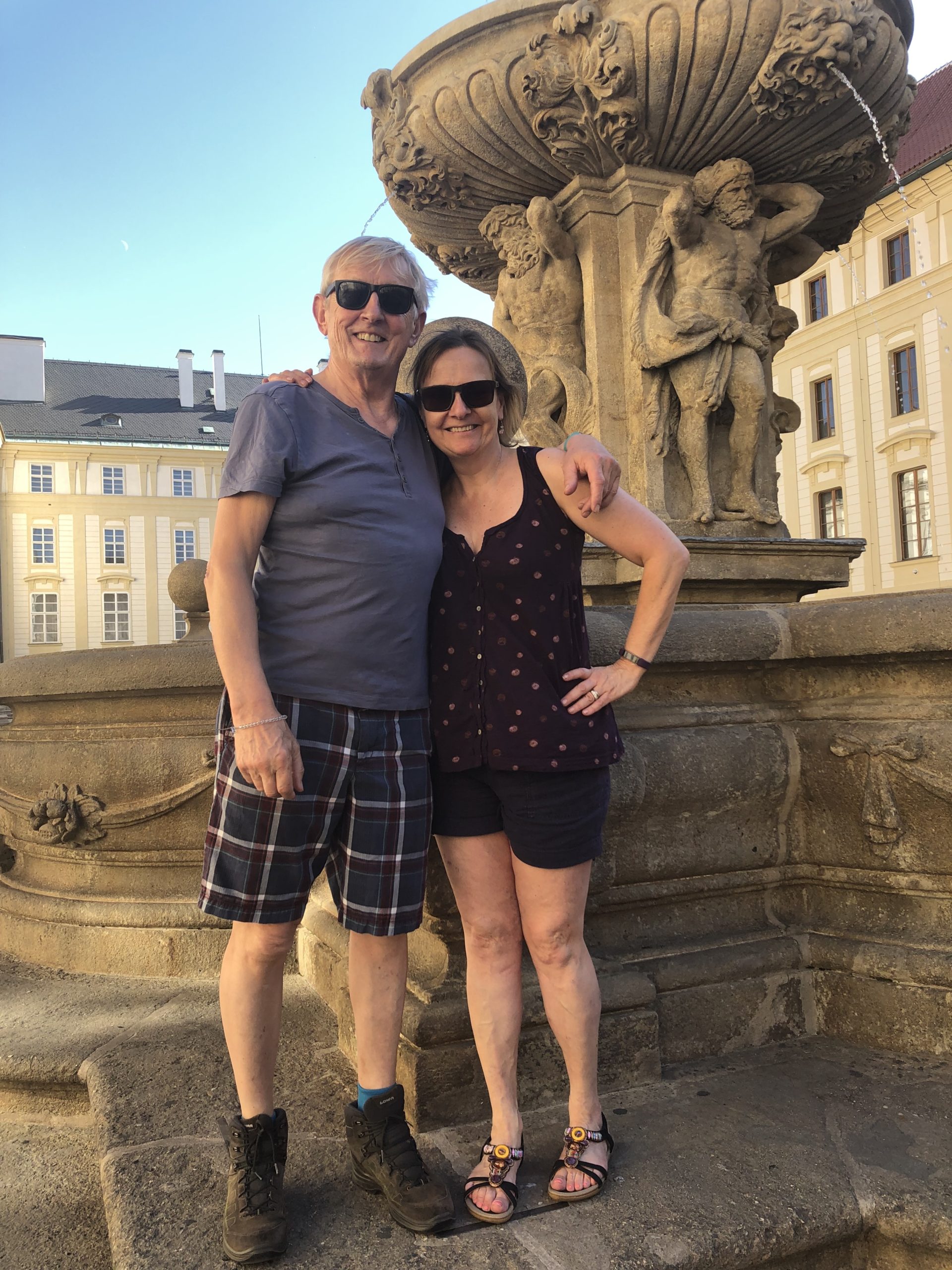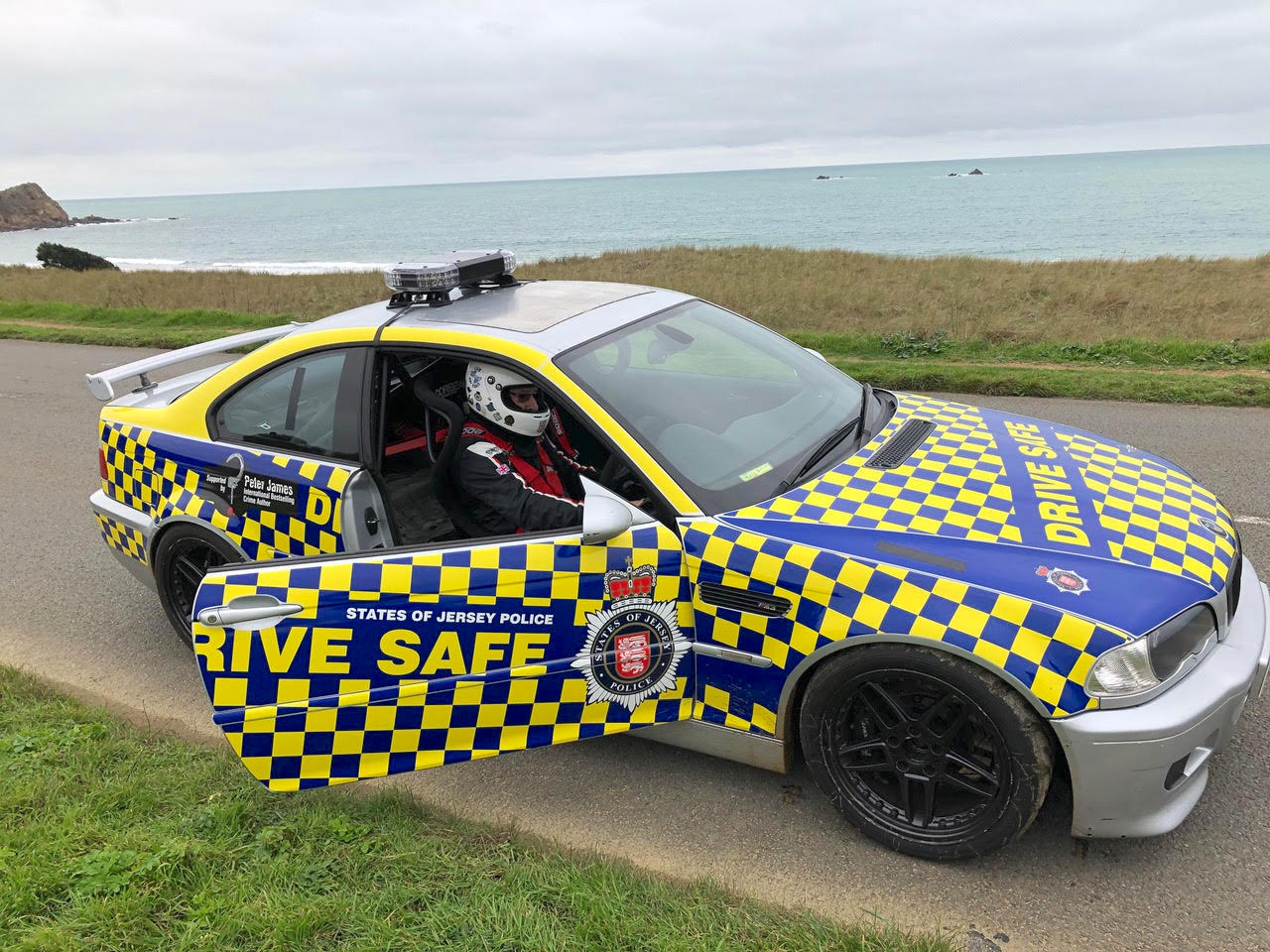
Peter James’ Police Drive Safe Campaign in Jersey.
This week we’ve flown, virtually, to Jersey to talk to intrepid traveller, Peter James. Peter is Britain’s bestselling crime writer and creator of Brighton’s Detective Superintendent Roy Grace. Global sales of his books top 20 million. And they’ve been translated into 37 languages. Roy Grace number 17 Find Them Dead comes out in May and we’ve been granted a sneak preview.
PH Peter, welcome to our travel podcast.
PJ Thank you Peter and Felice.
PH Very nice to see you. Haven’t seen you for a long time. Now I gather you’re living on Jersey, which is why we haven’t seen you. We used to live quite near you, not so far from Brighton.
PJ Yeah, we moved here two years ago. I wanted primarily to have a bolthole for writing, so we came over here with the intention of doing that, and just fell in love with the island and now we’re living here full time. Still have a place in Sussex but we’re here most of the time – and right now all the time. It’s a beautiful island. Lara and I are really keen on sport and I love cycling. And it’s only nine by five but there’s actually 500 miles of cycling roads and lanes. People are respectful to cyclists here, instead of in England where they go past you 80 miles per hour a foot from you. They’re more respectful here. They actually sit behind you. They won’t go by unless there’s at least a car width they can clear. The food is just fantastic. I love seafood: it’s got its own oyster beds, lobsters…a whole lobster is like twelve quid, It’s friendly, you know. People don’t lock their doors, it’s like going back in time, maybe 40, 50 years in England except with high technology.
PH And have you been in touch with the local coppers?
PJ I have indeed. I’ve actually lent on permanent loan one of my race cars, an old BMW M3, which is now marked up as a Jersey police car, and they use it to engage with kids. And they let me indulge one of my dreams, one of my bucket list dreams, which is to drive a police car on blues and twos on a public road.
PH You probably wouldn’t be able to do that in England.
PJ Not not in a million years. The police have been great over here. Really helpful to me, every which way.
PH A lot of people don’t know that, apart from being a very famous crime writer, you’re a bit of a petrolhead aren’t you?
PJ Yeah. I’m a fairly serious petrolhead.
PH I think, when we first met you, you had a much beloved Aston Martin. You still have that?
PJ No, I’ve had several. I haven’t. I’ve got a Porsche 911 because the Aston is too big for Jersey. The roads are quite narrow. But fun to drive, even with a tight speed limit. But I’ve got my big indulgences. I’m now racing a 1962 Corvette, which was kind of raced in period at Seebreem and Daytona. I raced at the Goodwood Revival last September. So that’s my big toy.
PH So you’re doing quite a bit of classic car racing, are you?
PJ Yes, I’m racing a Mini Cooper S as well, so I’m racing both of them at the Silverstone Classic in July and I’m down to race at Donington at the beginning of May. But I’ve got a feeling that’s going to be cancelled…and hopefully at the Goodwood Revival again.
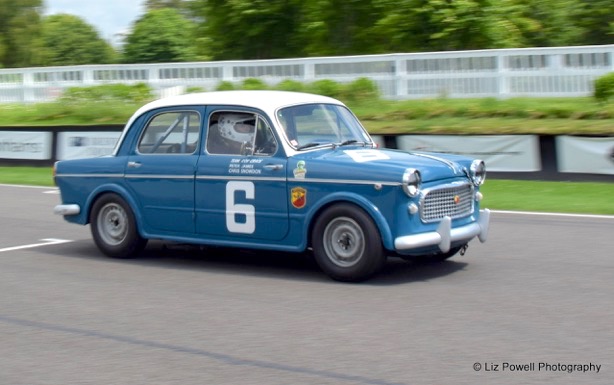
PH You had a pretty serious accident a while back?
PJ Yeah, it was 2013 at Brands Hatch. I was racing, I had a 1965 four-door saloon BMW 1800 TI and I was going into Paddock Hill bend, which is one of the fastest…probably the scariest bends on the race circuit, certainly in the UK. And I got tapped by a old Cortina and knocked me sideways. I went over four times at about 95 miles per hour, busted three ribs, damaged my spleen. And the car had, ironically, on its back…I always used to put the title of my latest book on on my cars and it had blazoned on the back Deadman’s Time and the marshall getting me out of the wreckage said: ‘Obviously not yours, mate.’
FH It sounds like you were lucky. Very lucky.
PJ I was actually lucky. I think it could have been a very much worse outcome. Luckily, that car had a really good safety cage.
PH So you do quite a lot of exercise to keep fit then, obviously?
PJ I do. After the accident…I had always been a runner…and I had to stop running for a long time because of my three discs. But I found what really helped was Pilates and swimming.
FH Yeah, I do Pilates as well. I find it great for the back.
PJ Yeah, Pilates. I do yoga as well. My yoga teacher comes twice a week. Swimming…and I find I do a lot of weights and general exercises…touch wood, my back’s pretty much ok now. I’m back doing a bit of running, cycling’s slightly less impactive, and swimming…and of course skiing and a bit of tennis as well.
FH So when you’re in Jersey…can describe a typical day in your life there? And will you work most of the day or do you have time to do other things, like go to the beach and that sort of thing?
PH How many hours do you write per day? That’s the question.
PJ One of the great things about Jersey is that, among other things, we wanted was to have slightly less distractions. In England – it was a nice problem – but because I was working in an office that people were constantly dropping by, wanted me to sign this book, could I open this, could I open that? And I wanted to get away and just have a bit more time. And that was our initial reason, more than anything else, for going. And it’s great. We have, you know, actually doing things a bit more in the daytime together that we weren’t doing in England.
My typical day is I get up at around half six, take the dogs out for about half an hour. On the way I feed our Indian runner ducks. We’ve got two lots of hens, so I feed the two lots of hens…and we’ve got pigmy goats – four pygmy goats – they’re called Bosco and Margeaux named after wines, and Ted and Norman named after serial killers. Then we’ll walk the dogs about half an hour across fields, which we can go straight out onto from here.
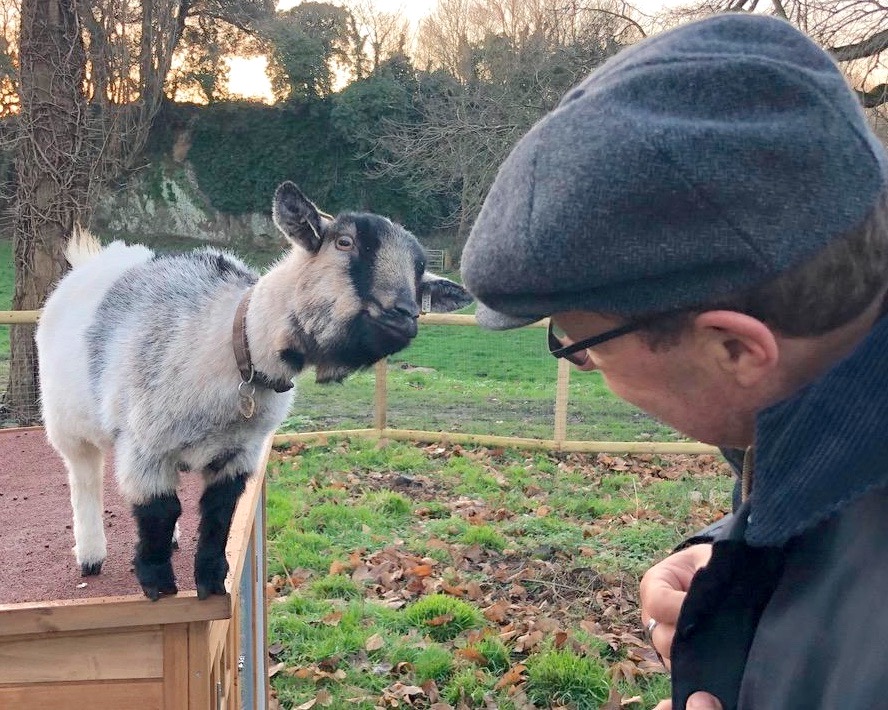
And then, depending on the weather, I either swim for half an hour or do half an hour on the cross-trainer or treadmill…or just weights and gym, have breakfast. I’m a big breakfast fan – I think it’s a really important meal for me. I love cooking omelettes and all kinds of eggs. And then I get in my office and faff around, I think like most writers do, for a long time, trying to avoid settling down to write for as long as possible. Check emails, Twitter, Instagram and then I’ll write from about 10.15am to about 1/1.30pm. Then break, and Lara and I have lunch. And there most days I either play tennis in the afternoon or take the dogs for a walk. We might go out and do something or have some lunch somewhere. But my real best writing time is 6pm in the evening till about 9pm. And that’s when I really hunker down, it’s my creative time. I’d start at 6pm, have a stiff drink – it varies with each book. My default one is a vodka martini, currently I’m on gin and tonics.
PH It that for the new book, gin and tonic?
PJ I’ve been on gin and tonic for the last eight months. So I have one stiff gin and tonic, then two or three glasses of wine, put on music and really get in the zone. Sometimes have a cigar as well.
PH What music do you like?
PJ Very eclectic. I play a real mix of rock, jazz, everything from Passenger, Van Morrison…and that’s for the first two-thirds of the book. And then the last third I play opera arias. They kind of move me towards the climax, they really lift me.
PH How long does a whole book take to write?
PJ About seven months. Roy Grace is about seven months from the time I write the first sentence to the time I write the last sentence, and then it’s another four or five months in the editing process.
FH What sort of writer are you? Do you plan your books ahead or do you just go for it? How does it work?
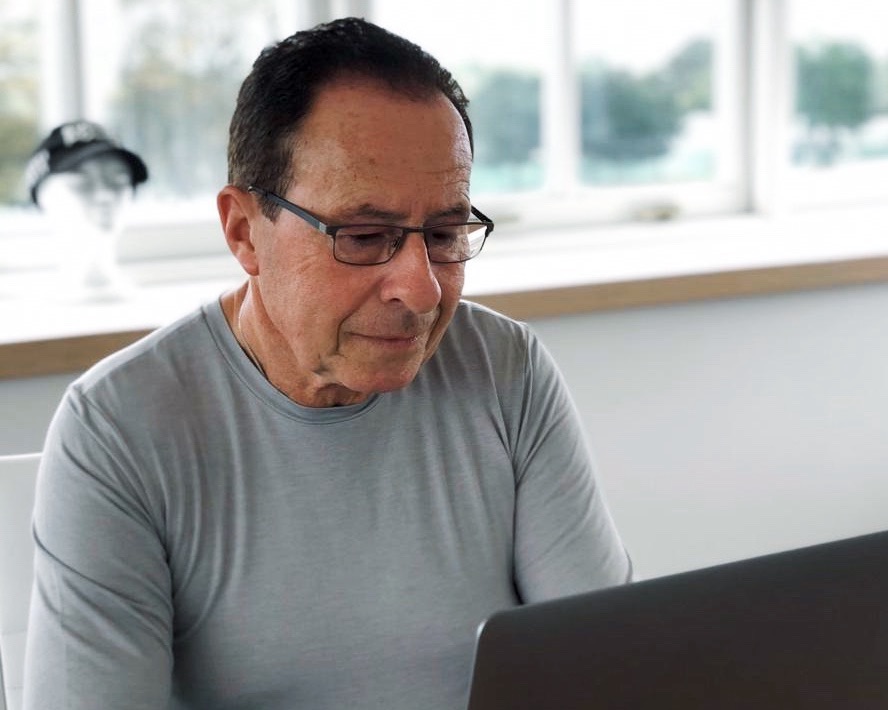
PJ I’m a mixture of plan and spontaneity. People often ask me about writer’s block. And the first question I say to someone who says ‘I’ve got writer’s block,’ is ‘Do you know the ending of your book?’ And invariably they’ll say ‘No.’ And I say: ‘Would you get in a car and start driving somewhere without having any idea where you’re going? Whether you’re going to be driving down to Dorset or to your local Tesco.’ I find it’s the same with writing. I always want to know the ending of the book. It gives me a vanishing point on the horizon. I plan about the first 20% and I plan the key high points. I plan three high points that I want to give the book a shape, so I know very clearly where I’m going for the first hundred pages and I know the ending and I know the key high points I want to hit, but then I really love it when I surprise myself as well. I think if you don’t surprise yourself, you’re not going to surprise your readers. But every writer works in a different way. I mean Lee Child just sits down and just starts writing. For me I think an element of structure is important.
PH And you intend to keep on writing? Roy Grace will keep going?
PJ I’m always told that if I was to retire, all I’d do is write a book, so I might as well keep going. But no, very luckily with Roy Grace…I’m desperately grateful to my readers…the sales have just been continuing to rise with every book. I love writing them. I find the world of the police endlessly fascinating. My new book, Find Them Dead, is the first time I’ve actually written about a trial, so I’ve been sitting with judges on the bench on a couple of murder trials. It’s just been fascinating. I just love getting to know the behind-the-scenes stuff.
PH What about research? I mean, Find Them Dead, I understand, has an Ecuador connection, a South American connection. Have you been out there to research things or you don’t need to do that? Haven’t read the book, so I don’t know.
PJ It is a great question, because I remember when when I wrote my first ever book – a spy thriller called Dead Letter Drop, it was about a mole in MI5, and I made it all up. And then I wrote the second book – I had a two-book contract – and I had some key scenes set in Namibia…it’s a terrible book, don’t read it. That’s Atom Bomb Angel. The story was about a guy whose father was a uranium mine worker in Namibia and he contracts cancer and dies and his son wants to get revenge on the rest of the world by blowing up a nuclear power station in England. So I had key scenes in Namibia and I couldn’t afford to go there at the time. So I got it all from a library. I met somebody who’d been out there and I made a few notes. And I remember when the book came out, the first interview I did with a journalist…she said: ‘What was it like out in Namibia?’ ‘Well, it’s quite hot and sandy.’ I not only lied to this lady, I’ve lied to everybody who reads this book, and I just vowed never again what I write, anything, any place that I hadn’t been to. And so, yeah, we went out and spent three weeks in Ecuador in April last year.
FH Have you got any favourite destinations, favourite places you’ve been to do research for your books or perhaps least favourite as well? Oh, how about the scariest, there’s another option?
PJ Some of the trips when I got out with the police can get quite hairy at times. I was out with the police in Moscow and the car got shot at. I thought, that’s quite interesting, I’m not sure want to be here.
And I had quite a funny one when I was out with the Sussex police a few years back. It was a Thursday night and I was with a very young sergeant and a very young Indian woman police officer – her first week out of what they call probation. And we were up in a really rough area, a sink estate. And there were ten youths all walking down the street necking bottles of booze. And that’s a criminal offence in Brighton, you cannot have an open bottle of booze on a public street. So they stopped and got out, it was about 10 o’clock at night and these youths were really nasty, rude, and they were shouting abuse, racist abuse at this Indian woman: ‘Nobody’s gonna take our fucking bottles off us.’ And I can see the sergeant radioing for backup.
And when I go with the police, they usually give me a yellow jacket and it’s either got Police or Observer on it. So I was just at the back and I happened to have my right hand in my pocket, which became a really good thing. I had my notebook out and I could see this was gonna turn into a fight. So I’m thinking mmm…do I leg it? Do I get in the car, lock the door? I thought, well, all I can do if I’m going to save face is I’ll have to help the police and get stuck in, because backup can take 20 minutes, half an hour in a remote part of Brighton on that time on a busy Thursday night. So I start looking around for the smallest guy. I think I’ll hit him first. One of them suddenly looks at me, he points a finger and says: ‘Who the fuck’s ‘e?’ And I was standing there, my right hand in my pocket. And the sergeant, as quick as a flash, says: “He’s with the FBI.’ They must have thought I had a gun in my pocket because they all turned into pussycats, put their hands up, handed over their bottles. I thought ‘respect’.
FH As well as playing tennis and cycling and motor racing, skiing is a passion of yours, isn’t it? And we’ve skied with you. In fact, a few times.
PH We last did in Jackson Hole, or somewhere like that.
PJ Yes, and Val d’Isere one year.
PH But skiing is something that was a passion early on in your life?
PJ Yes. My mother was Austrian so I was taken skiing from the age of five. I was asked if I’d join or train with the British ski team when I was 15. My parents very luckily said no because I was doing my ‘O’ levels at the time. And I also didn’t think, as much as I love skiing. I mean, my childhood I’d go for a fortnight at Christmas with my mother and a fortnight at Easter – mostly to Lech at Christmas and Zurs at Easter. But I remember I was in a minibus with Konrad Bartelski and I said: ‘How did you start?’ And he said:’When when I was about 17 and four of us got a minibus and we would drive down in November, get to the first place in the Alps that had snow, get the first lift up, last lift up seven days a week for the entire ski season, then working in bars at night.’ And I just would not have had that dedication.
PH You like to go on skiing holidays?
PJ I just love it. And if I had to give up any holiday, I would give up a summer holiday. I hated school when I was at Charterhouse and I used to used to live for the times when I’d be away skiing, just being up in the mountains. And I still love it. I’ll go on skiing for as long as I can stand up.
PH And you’ve just been to Courchevel in the last week or two, which is kind of a tricky moment in our history. What happened there? Did you get to go skiing?
PJ Yes., I managed three days before the resort was shut down on a Sunday morning for the Covid 19. I like Courchevel. Well I mean it’s a funny place and there’s one hotel the Chabichou, which we’ve been going to for some years but unfortunately it’s now changed hands. We were the first year back under its new management and we only had three days so haven’t really given it a chance. But its prices have gone up quite a lot and it hasn’t got the sharpness and friendliness that we felt for several years under the family ownership. But we’ll go back next year and give it one more go. But if not Courchevel then my favourite place for years was Zermatt. I haven’t been back to for about eight or nine years, but I’d love to give that another go.
PH Yes, that’s another favourite of ours as well.
FH What about summer holidays? Do you have favourite places?
PJ For many years I’ve gone down to the south of France to a place called Cavalière, which is about 20 miles east of St Tropez. My parents had a flat near there when I when I was a kid, so I spent all my childhood summers down there and I loved it. And I speak French. But we had a favourite hotel there, and that, too, was family owned. And that’s just changed hands so I’ve been slightly blighted. I actually love going on a warm holiday in winter. This last summer we spent most of it here in Jersey because it’s such a beautiful place in the summertime. Couple of years we’ve been into the Maldives – once in January and once in November, in fact twice in January and once in November. And the Maldives is definitely a big favourite. So beautiful. And you feel very safe there because – touch wood – they are pretty much crime-free because every hotel is an island.
PH You must find it rather strange to go somewhere crime-free. It’s your lifeblood.
PJ Yes, I know. It’s a bit boring, really.
PH Do you write when you’re away on holiday?
PJ I don’t. I try not to, but I make notes all the time. You guys are writers, too, you probably know what it’s like. You wake up at 3am in the morning and you know, if you don’t write something down, the next time you wake up, you’ve forgotten it. You’ll be cursing yourself. So, unless I’m really, really up against it, what I do on a holiday is binge read. I don’t like to read fiction when I’m actually writing, because it’s so easy to get influenced by somebody else’s style. So I tend to save up all the books I really want to read. And once I’m on holiday I can get get through a book a day.
PH You’re a fast reader?
PJ Yes, although the more I’m enjoying a book, the more slowly I read it. I think if I’m really enjoying a book then I don’t want to miss the descriptions and things. I did a speed reading course at Toronto University when I was living out there in the seventies and it’s really stood me in good stead because I can if I need to, read a book really fast…like 20, 30 minutes.
PH A lot of people don’t know that you’ve also had another career in movies as well. Is that something that you continue with?
PJ No. I made a conscious decision back in 2005 when the first Roy Grace book Dead Simple really took off. Big difference between writing and the movie industry: the first is that the movie business is culturally dishonest. Almost any money you make other than the fees you get paid get ripped off by the distributors, no matter how well a film does. Whereas a book in which you make 30 euros photocopying charges in the Swedish public library, you actually get the money.
But more than that, it’s that the movie business is a collective always, so any film you made, there’s 20 different people all claiming ownership of the film. You have the co-producers who say: ‘It’s our film, darling,’ and the director says: ‘No, it’s my film, darling.’ The director of photography says: ‘He’s an asshole. It’s really my film. I saved the film.’ Then your four lead acts say: ‘Actually darling, it’s our film.’ Then the production designer says: ‘Look, the film would’ve been complete shit if it hadn’t been for me.’ Then the editor says: ‘The film was shot. I say that I cut it together. It made some sense out of it. And then the composer says: ‘The film is a complete fucking disaster. It’s my music that’s turned into something worthwhile.’ Then the distributor says: ‘Oh, we don’t like the ending. Can we reshoot?’ We fight all the time, mostly with idiots. In a book I don’t have to change a single word. And I just love that. And it’s also the egos that you’re up against.
I made a film with Peter Sellers, on our neighbouring island of Guernsey, and afterwards we made a cigarette commercial with them for Benson & Hedges gold cigarettes. And I think he was the most expensive day’s pay for an actor in the history of motion picture industry. I think Sellers got £100,000 for one day’s work. This was a 1973 shooting of Benson & Hedges gold cigarette commercials, Sellers, Spike Milligan and Peter Villiers.
We were filming in Cyprus and the basic set up was Sellers standing outside a bonded warehouse, smoking a fag. Spike Milligan does a raid in a Mackintosh. Instead of gold ingots it’s packets of Benson & Hedges gold cigarettes. The alarm goes off. Sellers would run down the jetty into the getaway boat. He was so laden down with all these packs that he is practically at the bottom of the boat. Sellers was flown in and the director says, Okay, Peter first set up. You stand outside of their house, light a cigarette, you look nervous. Sellers says: ‘I’ve decided I’m against smoking.’
I explained to him that the reason he’s being paid the highest amount of money ever paid to an actor for one day’s work is to make a cigarette commercial. I phoned his agent in London. Denis said: ‘I’m sorry, Peter can be tricky.’ And we had the agency there and they said, look, why don’t we just swap – let’s have Spike with the fag. Peter does the raid. So we get Spike Milligan. over and I explained to him, and he said: ‘Solidarity is with my friend Peter. I’m not smoking either.’ We get to midday. We’ve not shot one single frame of footage. Peter Villiers says: “Oh fuck it, I’ll smoke the bloody thing.’
That’s why I’m not in the movie business.
PH You’ve had a low points and high points. I mean, Spanish Fly was your famous low point?
PJ That was definitely my low point.
PH Tell us about it.
PJ Well, there’d been a film with Lesley Phillips and Julie Edge called Not Now Darling, which had become a huge success in many countries, in particular Canada where I was living back at that time in the early seventies. The Canadian distributors said: ‘Could you produce something similar to that? How about if we had another star in it, as Lesley Philips is not known in America.’ I said: ‘Who would you like?’ He said: ‘Well, Terry Thomas would be perfect.’
So myself and my partner wrote a script called Spanish Fly with Terry Thomas, Leslie Phillips – all set in Spain. And it was basically a very bright, tasteful story about Leslie Phillips as an underwear manufacturer, basically modelled on Janet Reger. And Terry Thomas is an old rogue living in Menorca, making cheap plonk but doctoring its flavour and putting an expensive French chateau label on it. Leslie Phillips arrives in Menorca to shoot an underwear commercial. Meanwhile, Terry Thomas’s butler has by mistake put some Spanish fly beetle into a new stock of wine and then had to explain the results.
The film came out and Barry Norman described it as: ‘The worst British film since the Second World War, and the least funny British funny film ever made.’ He did admit the following week: ‘I trashed that film, but my minicab driver said he really enjoyed it.’ It also had the misfortune of coming out the same week as Jaws.
PH Then there was a high point: Merchant of Venice was something that you’re proud of having been involved in?
PJ Immensely proud. I ran the company that made Merchant of Venice with Al Pacino, Jeremy Irons, Joseph Fiennes. And that was a really happy experience and I loved that film, I suppose, partly because of my Jewish roots through my mother. It’s a play that’s always had very Semitic overtones. And I remember the great review that we had by The Globe and Mail in Toronto, which said: ‘This is not an anti-Semitic play. This is a play about anti-Semitism.’ And I feel that’s what we did with that play…that film. And I’m really, really pleased.
FH Changing the subject, I remember coming to your house once and seeing you had a stuffed crocodile or stuffed crocodile’s head. You still have that? Do you have other macabre things as well?
PJ Yes. The crocodile has its own particular place in my heart because it was politically significant in the divorce of my first wife. We’d been on a Nile trip because we’d taken a trip from Aswan across the desert. And I don’t know if you’ve ever done that – down to Abu Simbel – it’s four hours across arid desert. We were all getting back in the coach and there was a market stall selling the usual tourist tat – a plastic pyramid…
I was just about to get back on the coach and saw this crocodile head. It was about three foot long. So I rushed over and I said: ‘How much is that?’ And the guy wanted about 300 quid. So I just turned away. He said: ‘Make me an offer.’ So I offered him £5 and I got a torrent of abuse and I got the crocodile head. Fifteen quid. I said: ‘Well, put it in something safe. Give me a bin liner.’ And I got it back to the coach and my ex, Georgina, said: ‘What the hell is that?’ I said: ‘A crocodile head. She said: ‘I don’t want it. Leave it.’ So I got the coach driver to put it in the locker for the four-hour coach ride back across this searing desert.
About two hours in and…sniff sniff…you know I didn’t check that…I assumed it was stuffed – maybe it was just dead? People were gagging by the time we got to get back to the ship. And she said: ‘Throw it away.’ I said: ‘I’m not bloody throwing it away.’ And we had a spare suitcase; we’d taken a couple of spare suitcases for buying stuff. So I got all the suitcases out and I got one of the cabin crew to put it in the ship’s freezer and we flew it back to Gatwick. Even by the time we got down to Sussex, it was ponging again and she said: ‘It’s not bloody coming in the house.’
So I left it in the garage overnight and I got out the Yellow Pages and I found a taxidermist about 10 miles from us. So I phoned him up and said: ‘I’ve got this three-foot crocodile head.’ He said: ‘I don’t believe you.’ I said: ‘I’ve just flown in last night with it. He said: ‘I hate to think how many quarantine laws you’ve broken in Britain. I’ll have a look at it.’ So I drive it over and he said: ‘You’re not going to believe it. My dad was a taxidermist before me. For 40 years we’ve had in this drawer…’ and he opens the drawer, takes out a pair of glass crocodile eyes.
I have it mounted on a plinth and I call it Georgina.
PH You’ve always had a strong interest in psychic phenomena and things like that. How did that come about for you?
PJ Initially, it came about when back in 1983, the son of really good friends was killed in a horrible car crash when a Frenchman drove the wrong side down the Paris-Lille autoroute and killed their son and a friend who he was travelling with him. Long story short, the parents got persuaded to go to a medium and they started seriously believing they were in contact with their son. And they asked me if I’d consider writing a book about their experiences. They felt it was helping them with their bereavement. And I got interested and I started talking to more and more people about it.
For a couple of years, I went to mediums, talked to priests, talked to exorcists, and one day I just had an idea. I thought, you know, lots of people go to a medium to get comfort if they loose a loved one. What about if a mother lost her son in a car accident and went to meet him to communicate with him and discovered that he’d murdered his girlfriend? And I had no writing success before that. I’d had my three bad thrillers published, and I wrote this as a thriller called Possession. And it became an instant hit. Every major publishing house in Britain bid for it and it went to number one here. And it went into about 23 languages and my publishers then asked if I’d write more in that vein.
On the success of the book…Georgina and I had always been townies…we decided to do the dream and buy the Big Old Country House. We bought this beautiful, quite dilapidated Georgian manor house just outside Brighton. The guy that we bought it from said: ‘You’re gonna like this. We’ve got three ghosts.’ Actually, he lied – there were four. The house was very seriously haunted.
PH Did you see ghosts?
PJ Well, the first day we moved in, this was in 1988 and the house had a big hallway. I’ve used it in my novel The House on Cold Hill which is based on that house. And there is actually a map of the interior of the house at the front of that book. But the house had a porch and a long panelled hallway, which went into an oak-panelled anteroom. You walked through the gate, into the kitchen. And I was standing with my mother-in-law, who’s a very down-to-earth lady. She was chair of the Brighton Hove Magistrates Bench at the time, but she had a fay side, too. She’d always have a particular dream that somebody she knew was going to die. We were standing there guiding the removals man. And I suddenly saw a shadow just move across the hall. And she looked to me. She said: ‘Did you say that?’ And I knew she’d seen something. And we’d both been townies. You know, I lived in London, in Toronto. I’ve been in L.A., Brighton, but never in the remote countryside.
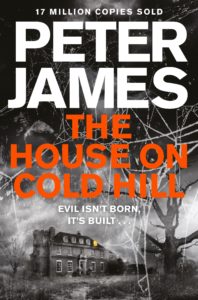
This house is on the edge of a hamlet, very isolated. And I don’t want Georgina to be spooked out on day one. And the next day, she went off to work. She was a solicitor at Brighton. And I went up to my office and I went down about half ten to get a cup of coffee and had to walk through this anteroom. And I saw tiny pinpricks of light. Dozens of them floating in the air. I thought my glasses were catching the light, so I took them off. Put them back on. Gone. I went down at lunchtime, same thing again. And it happened again in the afternoon. And Georgina came home from work. I thought, well, I won’t say anything. Maybe I’m just a bit spooked up by her mother yesterday.
The next day, same thing happened in the morning. And we had a dog, a Hungarian puli. I took Jesse for a walk down the lane. A little man came up to me and said: ‘Mr James.’ I said yes. ‘You just bought the manor?’ I said yes. He said: ‘How you getting on with the grey lady?’ And I said: ‘What grey lady?’ He told me he used to house-sit for the previous owners because they had a place in Ibiza.
He said: ‘One January, Sunday night, I was sitting in that anteroom of the kitchen. We made it into a snug because it had heat from the Aga, it had an armchair and a television. And this woman in a grey silk crinoline with a really angry face just came out the wall, glided towards me. She flicked the edge of her dress, stung my cheek and disappeared into the wall behind me. I was out of there. Wild horses will not get back in the house.’
Great. Similarly Georgina comes home that evening, I thought, you know what? Maybe he’s crazy. I won’t say anything. And the following Sunday, her parents came to lunch. I took her mother aside and I said: ‘What did you see that day we moved in?’ She described this woman. Exactly. Then I told Georgina. She said, Well, actually, I’ve seen her several times. I didn’t want to tell you and worry you. Huh? Then we got a Medium in.
The Medium said to me: ‘You’re slightly psychic. What you’re picking up is just bits of her energy, those little pinpricks of light. I think you really need to get a clergyman in here.’ I was very friendly with a guy called Dominic Walker who at that time was Vicar of St. Peter’s in Brighton. He went on to become Bishop of Monmouth. But Dominic was also the chief exorcist to the Church in England at the time. They do believe it – both the Catholic and Anglican diocese have exorcists and they call them Ministers of Deliverance. But that’s what they are.
He came to the house and he said: ‘What I will do is I’ll stand in this room and I’ll try and tell her to go away. If that doesn’t work, then I’ll come back and we’ll hold a full requiem mass, funeral service. She is obviously an arrested spirit. So he just stood in the room and he said: ‘Go away!’ Everything calmed down with that particular one for the next four years, and there was nothing more from her in that room – except every time we went away, would always have somebody come in to house-sit and look after the dog and there would always avoid the one particular room upstairs. And even I felt something.
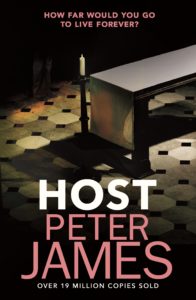
But in 1993, my novel Host just came out and I put a copy on the wooden chest in this anteroom. And I was having breakfast one morning about 7:45, and Georgina was upstairs getting ready to go to work. She shouted out: ‘I can smell burning!’ And I turned around and this book, in this room where we had all the haunting, was on fire. And I literally lunged across, grabbed it, went in the kitchen, chucked it in the sink, turned the tap on. And there was a perfectly prosaic explanation: there was a glass round paperweight sitting next to it, and the June sun had refracted through. But…
PH That’s a strange tale. Of all the people that you’ve written about, Roy Grace is your number one and he’s part of you, isn’t he?
PJ He is. Really. I think I’m just writing the 17th of the series. I can’t believe that when I started out writing that first one back in 2003, I’d be writing the 17th.
PH You never get tired of him and the different characters?
PJ You know, I don’t because I’m very lucky in that Roy Grace is based on a real character. When I had written my second bad spy thriller, I poured my heart out to a friend at Penguin – Lizzie Buchan – she’s now a successful novelist herself. And she said: ‘Why are you writing about spies? What can you ever know about the world of spies and you’re up against people like John Le Carré who come out of the security services. You’ll never will access that world – you’ve got to write about something you can access and you can research and that you’re passionate about.
Around that time we got burgled and a young detective came to take fingerprints. He saw my books and said: ‘If you ever want help with research, give me a call.’ And he was married to another detective. Georgina and I became friendly with them. They invited us to a barbecue at their house with all their friends who were cops. Everything from homicide, traffic, response… And I just found myself talking to these people. Wow, I thought, nobody sees more human life in a 30-year career than a police officer.
A journalist sees as much, but a cop has that extra thing that they can get anywhere behind the scenes all the time. And over the next few years, we started making a number of friends among the police. When they realised I was genuinely interested, they started inviting me out on patrol. And one day in 1996 they said: ‘There is a homicide D-I you might quite enjoy meeting, called Dave Gaylor. And I went to his office and we just kind of clicked. He said: ‘What are you writing at the moment?’ And I was writing a psychological thriller called Denial. He said: ‘Tell me about it.’ So I started telling him and he said: ‘No, no, your character wouldn’t have done that. Why hasn’t he got an outside inquiry team doing this? I don’t think she’d did behave quite that way.’
I thought, well, this guy’s got really big bandwidth, and it’s something that I’ve learned subsequently that good homicide detectives, quite unlike the portrayal we tend to see on television when they can be grumpy and shouting at people, tend to have a very high degree of emotional intelligence. And they have also two completely contrasting character traits. One is that they are incredibly anal because every major crime is hundreds, if not thousands, of tiny pieces that have to be fitted together. But a lot of them are solved by sudden blue-sky thinking.
Dave Gaylor had both these attributes in spades and we became mates. And over the next five years, he rose to become detective chief superintendent – basically head of major crime for Sussex in 2002. And there was one time Pan McMillan approached me and said: ‘Have you thought of creating a detective as a central character?’ So I said to Dave: ‘How would you like to be a fictional cop?’ And he loved it. We’ve become even closer friends, he was best man when Lara and I got married. We get together every couple of weeks. We had an hour and a half on the phone with him earlier today planning the next book. He reads every hundred pages, tells me how, why Grace and other cops would think and act. And that’s been a big part of, I think, the success of Roy.
I think people who read are smart. Anyone who reads is intelligent. I think we don’t just want a good story – we want to learn stuff about the world in which we live. And readers can tell immediately if the research is accurate or not accurate. There is a lesson I learned going back to that book I set in Namibia. Always underpin the horizon with research. And so my relationship with Dave has been a fundamental part of the success of Roy Grace.
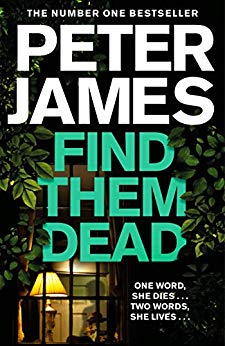
PH Your latest book Find them Dead is to be published on May the 14th. Can you give us a brief synopsis of what it’s about? This is another Roy Grace book?
PJ Find Them Dead is about essentially a forty-two-year-old widow called called Meg Margellan. Five years earlier, her teenage son and husband were killed in a car crash coming back from a family holiday. And she and her teenage daughter survived. And they’re immensely close. And her daughter is now on a gap year travelling in South America and Meg gets called up for jury service. And she gets on the trial of a major Brighton-based county lines drug dealer. And on the end of about the third day of the trial, she goes home and the photograph of her daughter taken in Ecuador is sitting on a kitchen table. And at that moment, a phone rings and a voice says: ‘We know where your daughter’s gonna be every moment of every day. If you ever want to see her again, at the end of the trial you have to get the jury to say just two words. And you know what they are.’
PH Peter, thank you very much. Find Them Dead is to be published on May the 14th. In good bookshops everywhere. Thank you very much indeed for coming on the show. And best of luck with the book.
PJ So good to talk to you guys.
FH That’s all for now. If you’ve enjoyed the show, please share this episode with at least one other person! Do also subscribe on Spotify, i-Tunes, Stitcher, or any of the many podcast providers – where you can give us a rating. You can also find us on Twitter, Facebook and Instagram. Stay safe and we’ll see you next week. If you enjoy this episode, please share it with at least one other person.
Visit Peter James’ website for more information on the author.
© Action Packed Travel

- Join over a hundred thousand podcasters already using Buzzsprout to get their message out to the world.
- Following the link lets Buzzsprout know we sent you, gets you a $20 Amazon gift card if you sign up for a paid plan, and helps support our show.
